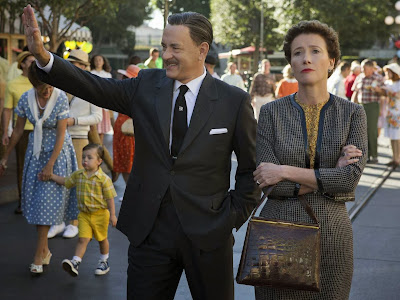Mary Poppins, one of Walt Disney’s own personal achievements
will turn 50 next year. To celebrate,
Disney Studios released a biopic about the making of the film. It’s witty and
enjoyable despite being a little self-congratulatory at times.
Saving Mr Banks follows Walt Disney’s (Tom Hanks) relentless
quest to persuade PL Travers (Emma Thompson) to secure him the film rights to
her closely guarded children’s book, Mary Poppins. Travers halfheartedly accepts Disney’s proposal when her agent manages to convince her on the grounds
that she is running out of money. Prim and uptight, Travers is not willing to
let Disney sugar-coat her creation. “Mary Poppins does not sing”, she warns
him, “I won’t have her turned into one of your silly cartoons.” Inevitably, the
joke is on her as the film winds up being one of Disney’s most popular family
favourites-with singing.
Pamela Travers would have been an interesting subject for a
film even if she hadn’t penned Mary Poppins. The Australian-born novelist was
the daughter of an alcoholic and unsuccessful bank manager (Collin Farrell).
Unable to cope, her mother attempted suicide while Travers was still a child.
The biopic flashes back to Travers’ girlhood in Australia which should have
worked in theory but this is where the film loses focus, detracting from the
scenes between Hanks and Thompson. Not only that, there is a suggestion that
Mary Poppins is simply a thinly veiled fictionalised account of Travers' own
childhood.
The majority of the action takes place in 1961 during the fortnight that Travers spent with Disney as he attempted to adapt her film for the big screen. In these scenes, the intricacy of Travers own life is ignored, instead presenting her as a lonely spinster. This was not the case in real life- although she never married, Travers did in fact have romantic relationships with both men and women. However, the rest of the film seems to be true to life- a real voice recording of Disney and Travers played at the end credits is close to the way Thompson and Hanks depict the relationship on screen.
The majority of the action takes place in 1961 during the fortnight that Travers spent with Disney as he attempted to adapt her film for the big screen. In these scenes, the intricacy of Travers own life is ignored, instead presenting her as a lonely spinster. This was not the case in real life- although she never married, Travers did in fact have romantic relationships with both men and women. However, the rest of the film seems to be true to life- a real voice recording of Disney and Travers played at the end credits is close to the way Thompson and Hanks depict the relationship on screen.
 |
| Collin Farrell as PL Travers father and Annie Buckley as Ginty/young PL Travers. |
The humour is well done. Upon arrival in America, her driver
Ralph claims that the sun has come out just to say hello to her. “Don’t be
preposterous,” is her reply. “Poor AA Milne”, Travers sighs when her California
hotel room is full of Winnie the Pooh toys. She arrives at Disney’s studio with
what appears to be an endless list of requests and a stubbornness to not back
down on any of them. “Oh no, no, no, goodness me, no, no, no”, she exclaims
when she sees the initial sketch of Number 17 Cherry Tree Lane. She doesn’t
want the colour red in the film, “I’ve just gone off the colour”, she states,
“I’m anti-red.”
The decision to cast Emma Thompson as Travers is uncanny as
new generations will recognise her as Nanny McPhee. Saving Mr Banks reveals an
artist’s struggle to preserve her work. The film climaxes on the battle between
art and entertainment, ultimately revealing that they can co-exist.

No comments:
Post a Comment